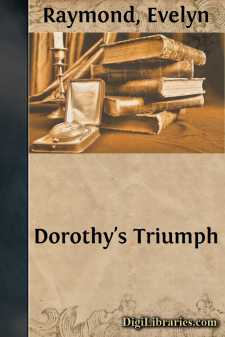Categories
- Antiques & Collectibles 13
- Architecture 36
- Art 48
- Bibles 22
- Biography & Autobiography 813
- Body, Mind & Spirit 142
- Business & Economics 28
- Children's Books 16
- Children's Fiction 13
- Computers 4
- Cooking 94
- Crafts & Hobbies 4
- Drama 346
- Education 46
- Family & Relationships 57
- Fiction 11829
- Games 19
- Gardening 17
- Health & Fitness 34
- History 1377
- House & Home 1
- Humor 147
- Juvenile Fiction 1873
- Juvenile Nonfiction 202
- Language Arts & Disciplines 88
- Law 16
- Literary Collections 686
- Literary Criticism 179
- Mathematics 13
- Medical 41
- Music 40
- Nature 179
- Non-Classifiable 1768
- Performing Arts 7
- Periodicals 1453
- Philosophy 64
- Photography 2
- Poetry 896
- Political Science 203
- Psychology 42
- Reference 154
- Religion 513
- Science 126
- Self-Help 84
- Social Science 81
- Sports & Recreation 34
- Study Aids 3
- Technology & Engineering 59
- Transportation 23
- Travel 463
- True Crime 29
A Sunny Little Lass
by: Evelyn Raymond
Description:
Excerpt
The One Room HouseIt was in “the littlest house in Ne’ York” that Glory lived, with grandpa and Bo’sn, the dog, so she, and its owner, often boasted; and whether this were actually true or not, it certainly was so small that no other sort of tenant than the blind captain could have bestowed himself, his grandchild, and their few belongings in it.
A piece-of-pie shaped room, built to utilize a scant, triangular space between two big warehouses, only a few feet wide at the front and no width at all at the rear. Its ceiling was also its roof and from it dangled whatever could be hung thus, while the remaining bits of furniture swung from hooks in the walls. Whenever out of use, even the little gas-stove was set upon a shelf in the inner angle, thereby giving floor space sufficient for two camp-stools and a three-cornered scrap of a table at which they ate and worked, with Bo’sn curled beneath.
This mite of a house stood at the crook of Elbow Lane, down by the approaches to the big bridge over East River, in a street so narrow that the sun never could shine into it; yet held so strong an odor of salt water and a near-by fish-market, that the old sailor half fancied himself still afloat. He couldn’t see the dirt and rubbish of the Lane, nor the pinched faces of the other dwellers in it, for a few tenements were still left standing among the crowding warehouses, and these were filled with people. Glory, who acted as eyes for the old man, never told him of unpleasant things, and, indeed, scarcely saw them herself. To her, everything was beautiful and everybody kind, and in their own tiny home, at least, everything was scrupulously clean and shipshape.
When they had hung their hammocks back upon the wall, for such were the only beds they had room for, and had had their breakfast of porridge, the captain would ask: “Decks scrubbed well, mate?”
“Aye, aye, sir!” came the cheery answer, and Glory’s hands, fresh from the suds, would touch the questioner’s cheek.
“Brasses polished, hawsers coiled, rations dealt?”
“Aye, aye, cap’n!” again called the child.
“Eight bells! Every man to his post!” ordered the master, and from the ceiling a bell struck out the half-hours in the only way the sailor would permit time to be told aboard his “ship.” Then Glory whisked out her needle and thread, found grandpa his knife and bit of wood, and the pair fell to their tasks. His was the carving of picture frames, so delicately and deftly that one could hardly believe him sightless; hers the mending of old garments for her neighbors, and her labor was almost as capable as his. It had earned for her the nickname of “Take-a-Stitch,” for, in the Lane, people were better known by their employments than their surnames. Grandpa was “Cap’n Carver” when at his morning work, but after midday, “Captain Singer,” since then, led by his dog Bo’sn, he sang upon the streets to earn his livelihood. In the later hours the little girl, also, wore another title–“Goober Glory”–because she was one of the children employed by Antonio Salvatore, the peanut man, to sell his wares on commission....












